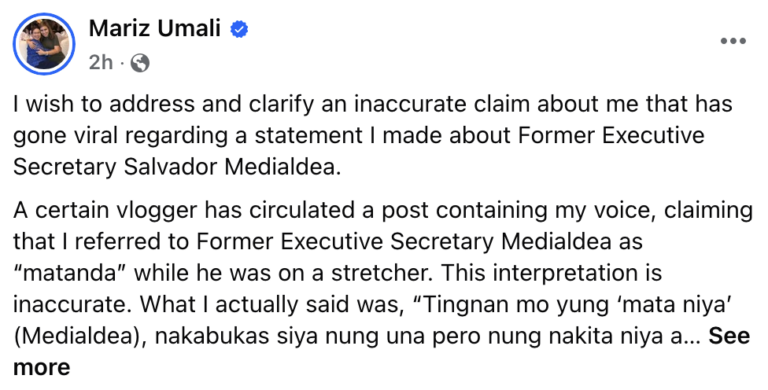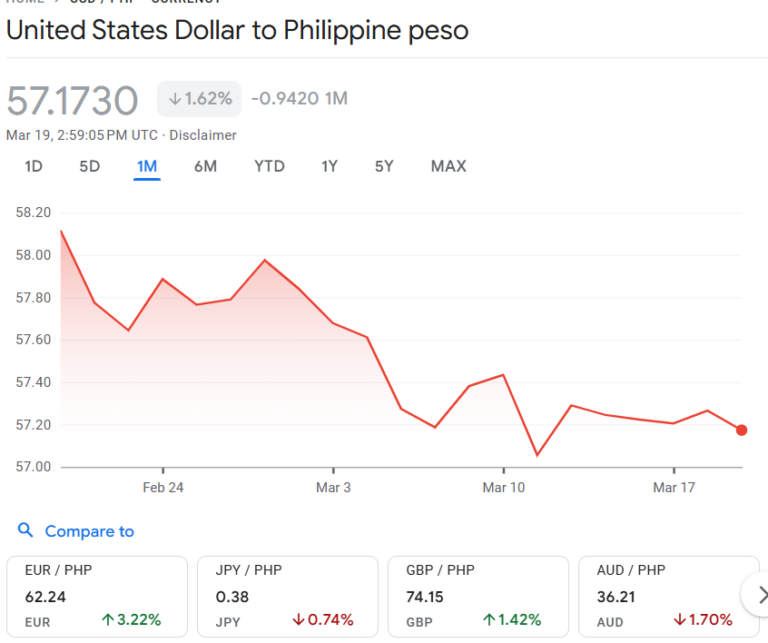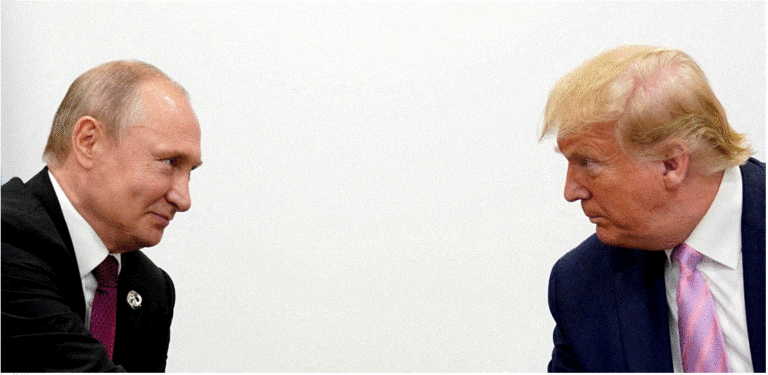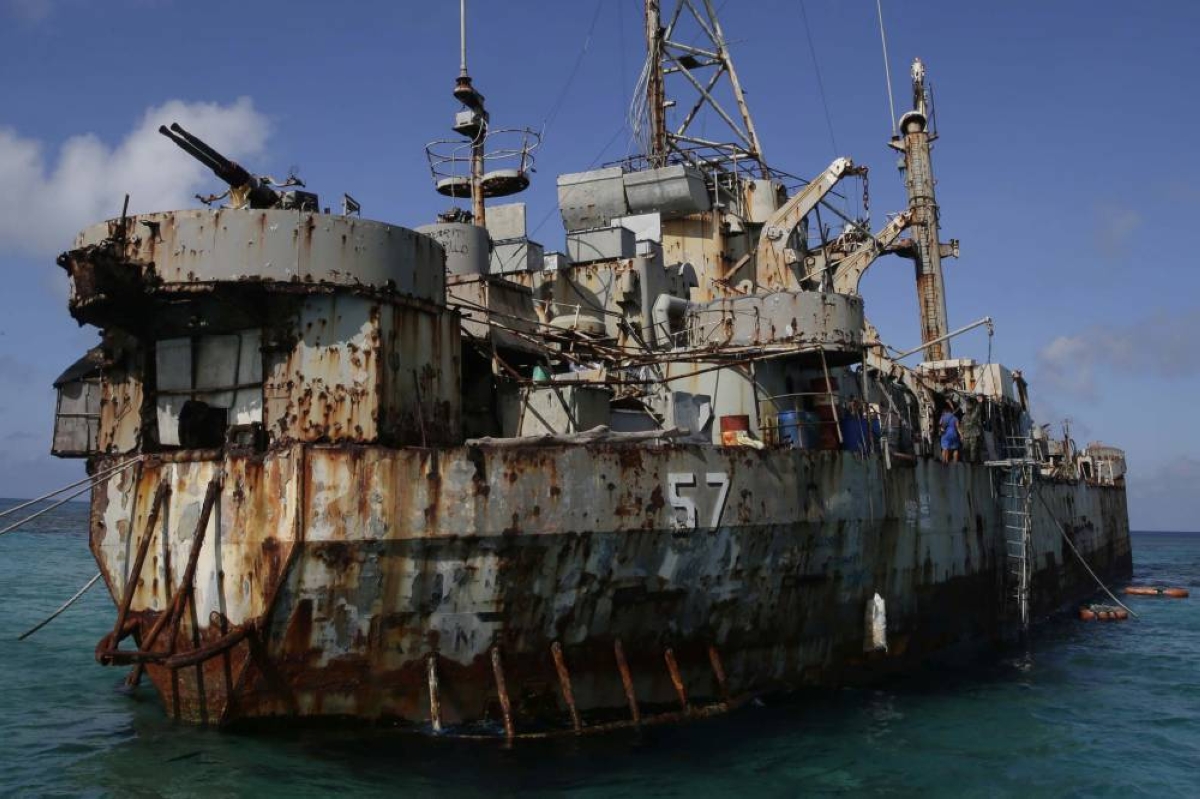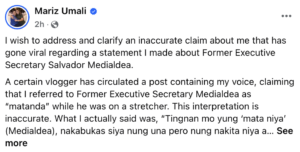Read this in The Manila Times digital edition.
(UPDATE) PRESIDENT Ferdinand Marcos Jr. on Wednesday insisted that there is no existing agreement between the Philippines and China to remove BRP Sierra Madre from Ayungin or the Second Thomas Shoal.
“I’m not aware of any such arrangement or agreement that the Philippines will remove from its own territory its ship, in this case, the BRP Sierra Madre, from the Ayungin Shoal,” the Chief Executive said in a video statement.
China’s foreign ministry claimed that the Philippines had earlier promised to withdraw the dilapidated BRP Sierra Madre from Ayungin Shoal.
Manned by personnel from the Philippine Navy and Marines, BRP Sierra Madre is now tagged as a “permanent military station” to “protect and secure Philippine rights and interests in the West Philippine Sea.”
A dilapidated Philippine Navy ship LT 57 (Sierra Madre) with Philippine troops deployed on board is anchored off Second Thomas Shoal, locally known as Ayungin Shoal, on March 30, 2014, in the South China Sea. Chinese coast guard ships blocked and used water cannons on two Philippine supply boats heading to a disputed shoal occupied by Filipino marines in the South China Sea, provoking an angry protest against China and a warning from the Philippine government that its vessels are covered under a mutual defense treaty with the U.S., Manila’s top diplomat said Thursday, Nov. 18, 2021. (AP Photo/Bullit Marquez, File)
Marcos said that should there be an agreement, he would overturn it.
delivered to your inbox
“Let me go further; if there does exist such an agreement, I rescind that agreement now,” he said.
National Security Council (NSC) Assistant Director General Jonathan Malaya also on Wednesday belied claims by China that the Philippines has agreed to remove the BRP Sierra Madre from Ayungin Shoal.
In 1999, the Philippines deliberately ran the BRP Sierra Madre aground on Second Thomas Shoal in the Spratly Islands to serve as an outpost of the Philippine Marine Corps to assert the country’s sovereignty in the disputed territory.
“There is no such commitment; there is no meeting, no treaty or agreement signed by the two countries regarding such talks,” Malaya said in a Laging Handa briefing, pertaining to the claim of the Chinese Foreign Ministry spokesman on August 7 that the Philippines promised to remove the ship.
He added that everyone they have talked to on the issue — from the present to past administrations — has no idea of the matter and that it is China’s duty to show proof or evidence of this claim.
Malaya said that if Beijing continues to assert this claim, it should identify the Philippine representative who made the promise.
“If China believes that there is such an agreement or promise, then they should identify the ones who promised them such. Maybe the one who gave them such a promise is not an official of the government because I can categorically say to the public and to everyone that no administration will agree to that because BRP Sierra Madre is the symbol of our sovereign rights and jurisdiction over Ayungin Shoal,” he added.
China’s Ambassador to Manila Huang Xilian was summoned by the Department of Foreign Affairs early this week over the water-bombing of Philippine vessels on their way to deliver supplies to troops stationed at BRP Sierra Madre.
The Department of Foreign Affairs (DFA) said it has “firmly asked” China to direct its vessels to stop their illegal action against Philippine vessels and to stop interfering in legitimate Philippine activities.”
Beijing, through its Ministry of Foreign Affairs, has accused Manila of trying to overhaul the military ship BRP Sierra Madre to “permanently occupy” Ren’ai Jiao or Ayungin Shoal.
The ministry said Ren’ai Jiao has always been part of China’s Nansha Qundao.
The ministry noted that in 1999, the Philippines sent the BRP Sierra Madre military vessel in the area and deliberately ran it aground at Ren’ai Jiao, “attempting to change the status quo of Ren’ai Jiao illegally.”
China “immediately made serious d?marches to the Philippines, demanding the removal of the vessel. The Philippines promised several times to tow it away, but has yet to act,” the ministry said.
“Not only that, the Philippines sought to overhaul and reinforce the military vessel in order to permanently occupy Ren’ai Jiao,” it said.
Beijing said that on August 5, “in disregard of China’s repeated dissuasion and warning, the Philippines sent two vessels that intruded into the adjacent waters of Ren’ai Jiao and tried to deliver the construction materials for overhauling and reinforcing the grounded military vessel.”
Austin calls
Meanwhile, United States Defense Secretary Lloyd Austin 3rd has condemned the China Coast Guard’s use of water cannons and other dangerous maneuvers in the South China Sea (SCS) which put the safety of Philippine vessels and crew “at risk.”
He reaffirmed that the 1951 Mutual Defense Treaty (MDT) between Washington and Manila extends to Philippine public vessels, aircraft and armed forces, to include those of its coast guard in the Pacific and in the South China Sea.
Austin on Wednesday spoke with Defense Secretary Gilberto Teodoro Jr. by phone to discuss the US-Philippine alliance cooperation, the Pentagon said in a statement shared by the US Embassy in Manila.
Both secretaries reaffirmed the “ironclad nature of the US-Philippines alliance and committed to redouble efforts to strengthen bilateral training, interoperability, and support for the modernization of the Philippine Armed Forces.”
Austin and Teodoro discussed China’s efforts to obstruct the Philippine resupply mission to Second Thomas (Ayungin) Shoal last August 5, a readout provided by Pentagon Press Secretary Brig. Gen. Pat Ryder said.
Austin joined numerous countries in expressing concern about these “unsafe operational activities, which undermine the status quo and directly threaten regional peace and stability,” the Pentagon said.
Article 4 of the MDT states that “each Party recognizes that an armed attack in the Pacific area on either of the Parties would be dangerous to its own peace and safety and declares that it would act to meet the common dangers in accordance with its constitutional processes.”
“Any such armed attack and all measures taken as a result thereof shall be immediately reported to the Security Council of the United Nations, Such measures shall be terminated when the Security Council has taken the measures necessary to restore and maintain international peace and security,” it further read.
Austin and Teodoro reaffirmed their commitment to uphold the rules-based order, including supporting the Philippines’ right to conduct lawful maritime activities, consistent with the 2016 Arbitral Tribunal Ruling, “which is final and binding on all parties,” Pentagon said.
Meet halfway
Beijing, through the Chinese Embassy in Manila, on Tuesday slammed Washington for repeatedly threatening China by citing the US-Philippines MDT.
China has accused the US of rallying its allies to sensationalize the South China Sea row as it expressed hope that Manila would meet Beijing “halfway” to resolve their maritime dispute peacefully.
Beijing said the SCS is not a “hunting ground for countries outside the region to meddle with, sow discord and provoke conflicts.”
Australia, Canada, Japan, France, Germany, New Zealand, South Korea, the United Kingdom and the US have expressed concern over the water bombing by the China Coast Guard of Philippine vessels on a resupply mission to BRP Sierra Madre.
The Chinese Embassy spokesman said the US has been inciting and supporting the Philippines’ attempts to overhaul and reinforce BRP Sierra Madre.
The US even sent over military aircraft and vessels to assist and support the Philippines, the spokesman added.
The US has also “extensively hyped up the recent maritime incident and attacked China’s legitimate and lawful actions at sea,” China said.
“Justice lies not in the loudness of one’s voice, but in the truth and rightness. The US attempts will lead nowhere,” Beijing said.

